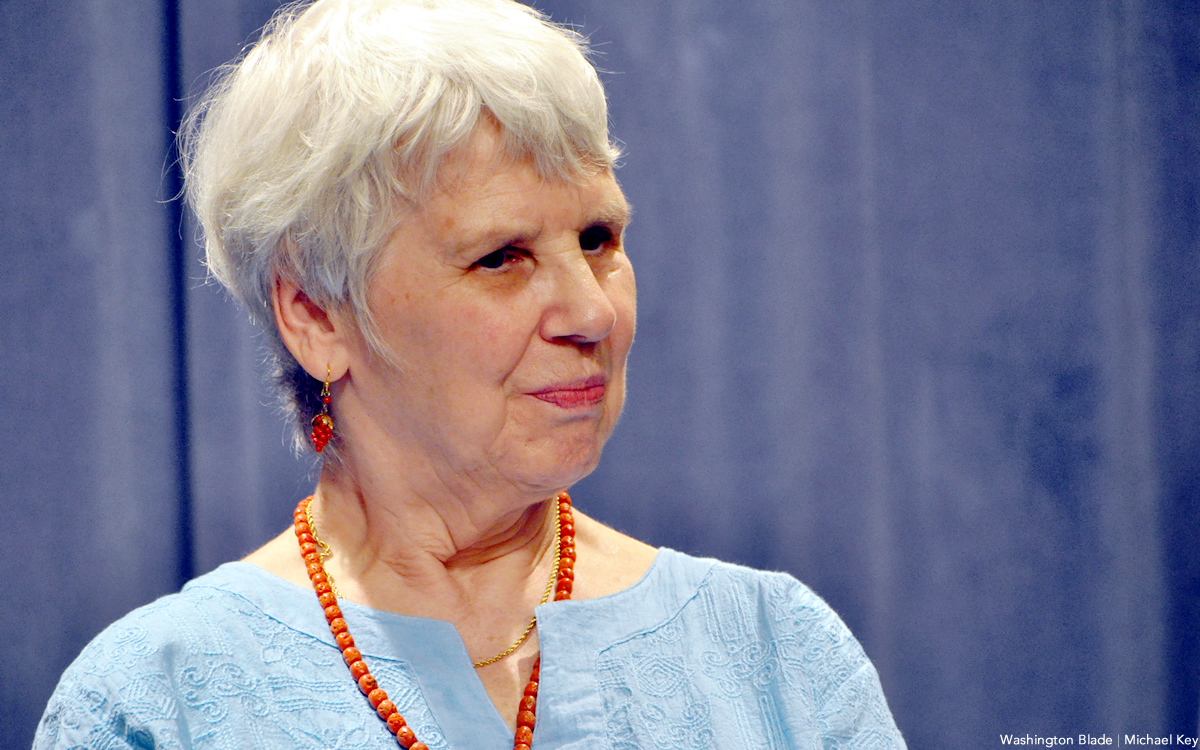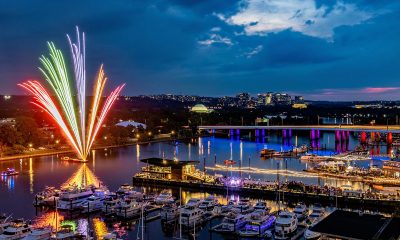Local
Rehoboth theater seeks support for new building
Town officials uncommitted on waiver for parking space requirement


Many residents and visitors to Rehoboth Beach, the popular Delaware resort destination, are urging the mayor and city officials to back a proposed change in the city code needed to allow a beloved performing arts theater to move into a larger building.
The Clear Space Theater Company, founded in 2004, has produced highly acclaimed Broadway style plays and musicals and operates an Arts Institute that teaches theater to students of all ages in a former church building it rents on Baltimore Avenue near the boardwalk.
Last September, the theater announced plans to build its own larger building that would include a 300-seat theater on Rehoboth Avenue next to the traffic circle at the entrance to the beach city. The current theater in the space once used by Epworth United Methodist Church has 192 seats and has become too cramped for rehearsals, classes and other activities, according to its staff and board.
Clear Space Theater officials said they made adjustments to the architectural plans for the new 25,600-square-foot building, including lowering its height, so it meets all city codes except for a requirement that it include 128 on-site parking spaces.
Wesley Paulson, the Clear Space executive director, said the nonprofit theater company doesn’t have the funds to include more than 28 parking spaces, which would be located in a basement garage under the current plans and budget for the new theater.
He has asked Rehoboth Mayor Paul Kuhns and the Board of Commissioners, which serves as the city’s legislative body, to consider designating the land on which the new theater is slated to be built as a performing arts district. Such a designation would exempt the theater from the parking space requirement.
During a Board of Commissioners workshop meeting on Feb. 4 two residents who said their houses are located directly behind where the new theater is planned to be built told commissioners it is far too large for what they say is a mostly residential area.
Paulson said the decision to lower the building’s height places it in compliance with the city code in terms of the theater’s size.
The Board of Commissioners, of which the mayor is a member, initially announced it would hold a vote on whether to make a code change or find another way to exempt the theater from the parking requirement at its Feb. 15 meeting. But during its Feb. 4 workshop meeting Kuhns and other commissioners said they prefer not to be bound by a vote or final decision on the matter by Feb. 15.
Kuhns said he believes the matter should be referred back to the city Planning Commission, which he said should make a recommendation on the best course of action the city should take in resolving the parking issue.
Kuhns noted, however, that he and commission members have received numerous emails and other messages urging them to support Clear Space Theater’s efforts to build its new theater at its chosen location.
Some of the messages are posted on the Rehoboth city website. Several point out that the theater brings people into Rehoboth from other parts of Delaware and nearby states who patronize the city’s restaurants and stores.
“We are encouraging people supportive of the theater to write to the mayor and city manager to urge them to support this project,” said Laura Mason, a member of the theater’s board.
“Seventy-five percent of our patrons dine in town at a restaurant when they come to the theater from outside of Rehoboth,” Mason told the Blade. “These are people who would not be coming to Rehoboth if not for a theater performance,” she said.
Among the plays performed at Clear Space Theater last year was “The Normal Heart,” the internationally acclaimed play by gay writer and activist Larry Kramer about how gay men grappled with AIDS during the early years of the epidemic.
Those interested in weighing in can email Mayor Kuhns at [email protected].
Virginia
Norfolk transgender resource center vandalized
Anti-trans graffiti spraypainted onto Southeastern Transgender Resource Center’s windows

The Norfolk Police Department is investigating the vandalism of a transgender resource center’s building.
Tarena Williams, founder of the Southeastern Transgender Resource Center, told WAVY that someone spraypainted anti-trans graffiti on the windows of her organization’s offices on Sunday or Monday morning. Williams told the Hampton Roads television station that seeing the messages was like “walking into hell.”
“I opened up STRC, even the Lamina House,” she told WAVY. “I opened up that to get away from those types of words. This is a place you can come to get away from that, but to see that sprayed over the window. It’s kind of like you are walking into hell. … To be honest, I was like in shock.”
Authorities are investigating the vandalism.
West Virginia
Appeals court strikes down W.Va. transgender athlete ban
Ruling finds law violates students’ constitutional rights, Title IX

BY LORI KERSEY | The 4th U.S. Circuit Court of Appeals has struck down West Virginia’s ban on transgender athletes, finding the law violates trans students’ rights under the Equal Protection Clause of the constitution and Title IX, a federal civil rights law prohibiting discrimination based on sex in education programs.
The case, B.P.J. vs. the West Virginia Board of Education, was filed in May 2021 on behalf of Becky Pepper-Jackson, a 13-year-old trans middle school student and track athlete who would be barred from participating if the ban is upheld. Pepper-Jackson is represented by the American Civil Liberties Union, the American Civil Liberties Union of West Virginia and Lambda Legal.
In April 2021, West Virginia Gov. Jim Justice signed into law a bill prohibiting trans women and girls in the state from participating in sports that align with their gender identity. The U.S. Court of Appeals in February 2023 blocked the state from removing Pepper-Jackson from her school’s track and field team as legal advocates appealed a lower court’s ruling upholding the ban.
In Tuesday’s ruling, Judge Toby Heytens wrote that offering Pepper-Jackson the “choice” between not participating in sports and participating only on boys teams is not a real choice.
“The defendants cannot expect that B.P.J. will countermand her social transition, her medical treatment, and all the work she has done with her schools, teachers and coaches for nearly half her life by introducing herself to teammates, coaches and even opponents as a boy,” the judge wrote.
“By participating on boys teams, B.P.J. would be sharing the field with boys who are larger, stronger, and faster than her because of the elevated levels of circulating testosterone she lacks,” he wrote. “The Act thus exposes B.P.J. to the very harms Title IX is meant to prevent by effectively ‘exclud[ing]’ her from ‘participation in’ all non-coed sports entirely.”
In a statement Tuesday, Joshua Block, senior staff attorney for the ACLU’s LGBTQ and HIV Project, called the court’s ruling “a tremendous victory for our client, transgender West Virginians and the freedom of all youth to play as who they are.”
“It also continues a string of federal courts ruling against bans on the participation of transgender athletes and in favor of their equal participation as the gender they know themselves to be,” Block wrote. “This case is fundamentally about the equality of transgender youth in our schools and our communities and we’re thankful the 4th Circuit agreed.”
“We hope today’s ruling sends a message of hope to the trans youth of West Virginia,” Aubrey Sparks, legal director of the ACLU of West Virginia, said in the statement. “And a message of warning to politicians who continue to dehumanize this vulnerable population.”
West Virginia is one of 21 states that have banned trans student-athletes over the last three years, according to the ACLU.
In a statement Tuesday, West Virginia Attorney General Patrick Morrisey vowed to defend the ban and said he is “deeply disappointed” in the decision.
“The Save Women’s Sports Act is ‘constitutionally permissible’ and the law complies with Title IX,” Morrisey said. “I will keep fighting to safeguard Title IX. We must keep working to protect women’s sports so that women’s safety is secured and girls have a truly fair playing field. We know the law is correct and will use every available tool to defend it.”
******************************************************************************************

Lori Kersey is a reporter with a decade of experience reporting in West Virginia. She covers state government for West Virginia Watch.
******************************************************************************************
The preceding article was previously published by the West Virginia Watch and is republished with permission.
Nonprofit, nonpartisan, independent journalism not hidden behind a paywall. Mountaineers are always free, and so is West Virginia Watch.
West Virginia Watch is part of States Newsroom, the nation’s largest state-focused nonprofit news organization.
District of Columbia
Reenactment of first gay rights picket at White House set for April 17
Event marks 59th anniversary of historic push for gay rights in nation’s capital

D.C.’s Rainbow History Project announced it will hold a reenactment on Wednesday, April 17, of the historic first protest for gay rights in the form of a picket line in front of the White House that took place on that same day in 1965.
In a statement released last week, Rainbow History Project says the reenactment will mark the 59th anniversary of an event that is credited with bringing attention for the first time to the federal government’s longstanding discrimination against a minority group referred to then as homosexuals or gays and lesbians.
The statement notes that the 1965 event was organized by the Mattachine Society of Washington, D.C., the first politically active LGBT organization in the nation’s capital founded by local gay rights pioneer Frank Kameny.
“The picket took place on the White House sidewalk, Lafayette Park, 1600 Pennsylvania Ave., on April 17, 1965,” the statement says. “For exactly one hour, from 4:20 p.m. to 5:20 p.m., members of the Mattachine Society of Washington walked in a circle, non-stop, in silence, carrying posters of their demands,” the statement continues.
“The White House picket is the origin story for public demonstrations for gay rights in the U.S., and the origin story for Pride Marches and the annual LGBTQ Pride celebrations which occur across the globe,” according to the statement.
It says those picketing in the April 1965 event, which included Kameny and longtime local D.C.-area lesbian activist Lilli Vincenz, both of whom held doctorate degrees, called on the government to adopt the Mattachine Society of Washington’s four major demands: an end to the exclusion of homosexuals from federal government employment; an end to the ban on gays and lesbians from serving in the U.S. military; an end to the “blanket denial” of security clearances for gay people; and an end to the “government refusal to meet with the LGBTQ community.’
Among those who chose not to respond to the request for a meeting was President Lyndon B. Johnson, who occupied the White House at the time of the 1965 picketing.
Vincent Slatt, the Rainbow History Project’s director of archiving and one of the lead organizers of the April 17 reenactment event, said the event is aimed, among other things, at drawing attention to how far the LGBTQ community has come since 1965. He said the event is not in any way a protest of the administration of President Joe Biden and Vice President Kamala Harris, who Slatt called staunch supporters of the LGBTQ community.
“We are just reenacting this historical event and pointing out how far we’ve come,” Slatt told the Washington Blade. “If you think about what it means in 1965 when these people were protesting and LBJ would not even respond to them. And now, we are at a place where Vice President Harris speaks on a stage at Capital Pride.”
The Rainbow History Project statement notes that the reenactment event will also be held in honor of Kameny, who died in 2011, and Vincenz, who passed away in 2023, both of whom participated in a similar reenactment event in 2008.
Among those who will be participating in this week’s reenactment on April 17 will be longtime local LGBTQ rights activist Paul Kuntzler, who is the only known surviving person who was among the White House picketers at the April 1965 event. Kuntzler will be carrying a replica of his own picket sign he held at the 1965 event, the statement says.
It says Rainbow History Project volunteers will also carry replicas of the original protest signs and hand out literature explaining the picket to passersby and tourists.
Similar to the 1965 event, the reenactment picketing at the White House will begin on April 17 at about 4:15 p.m., according to Slatt of the Rainbow History Project.
-

 Africa3 days ago
Africa3 days agoCongolese lawmaker introduces anti-homosexuality bill
-

 Colorado5 days ago
Colorado5 days agoFive transgender, nonbinary ICE detainees allege mistreatment at Colo. detention center
-

 World3 days ago
World3 days agoOut in the World: LGBTQ news from Europe and Asia
-

 Real Estate4 days ago
Real Estate4 days agoBoosting your rental property’s curb appeal













